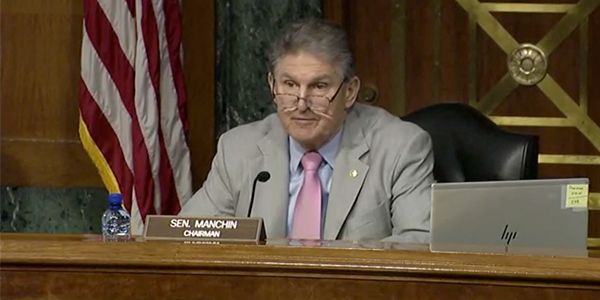The February winter storm and resulting dayslong outages in Texas loomed large over Thursday’s meeting of the Senate Energy and Natural Resources Committee, with members pressing representatives of the electricity sector for an explanation of the events and assurances that they are working to prevent future mass failures.
However, the committee emphasized that they were not interested in scapegoating a single state. Senators described last month’s disaster — when at one point nearly 49% of total installed generating capacity within ERCOT was unavailable and the operator came “seconds and minutes away” from complete breakdown — as a wake-up call about the vulnerability of the entire national grid. (See ERCOT was ‘Seconds and Minutes’ from Total Collapse.)
“[Let] me be clear: Today’s hearing is not a referendum on Texas,” Chair Joe Manchin (D-W.Va.) said in his opening remarks. “We’ve seen the impact of extreme weather events to our electric grid across the country … [and] we need to incorporate all of the lessons learned from those events into our future planning, particularly as we can expect both our energy mix and weather patterns to be different in the next decade than they were in the last decade.”
NERC CEO Jim Robb expanded on this theme in his written testimony, citing several weather-related incidents in recent years — including the August 2020 heat wave that led to rolling blackouts in California and grid emergencies in other Western states — to argue that no region is immune to disruption. (See WECC Findings Show Complexity of Heat Wave Event.) As severe weather events become more frequent, grid planners will have to be proactive about preparing their systems for stronger impacts.
No Universal Solution

What form that preparation might take was a major topic of questioning, with senators bringing up a variety of measures to ask what impact they might have had on the resilience of the grid during the weather events that Robb mentioned. Hypothetical improvements raised by senators included building out natural gas and other traditional assets to offset the purported unreliability of wind and solar facilities; implementing capacity markets to incentivize generators to make more resources available for potential surges; and expanding or improving transmission facilities to remove bottlenecks between supply and demand.
Attendees generally agreed on the need for more transmission, but they were more reluctant to endorse other recommendations in light of different regional needs. PJM CEO Manu Asthana acknowledged that his RTO’s capacity market was designed to prevent the kind of instability that gripped Texas in February, but he warned that the solution was not likely to be so simple.
“It’s easy to think, ‘Oh, if only Texas had a capacity market, this wouldn’t have happened,’” Asthana said. “I think Texas would have had a higher reserve margin [in that event], but it’s important to note that … Texas had reported a reserve margin for this winter of 43%” in NERC’s Winter Reliability Assessment. “And so it was not a shortage of capacity; it was this incredibly cold weather for which the capacity was not prepared.” (See NERC Warns of Fuel Bottlenecks in Coming Cold Months.)
Texas Faces Heat on Winter Prep

Several members seized on that lack of preparedness, using Robb’s observation that FERC and NERC had issued a cold weather preparedness guideline following the 2011 cold weather event in Texas and Arizona to suggest, in the words of Sen. Mazie Hirono (D-Hawaii), that “they probably didn’t follow your recommendations very well.”
Robb was guarded in his response to Hirono. While he acknowledged that the cold weather preparedness standard currently under development at NERC “no doubt … would have helped” in last month’s crisis, he reminded members that the situation was extremely complex. For this reason NERC and FERC are conducting a joint inquiry to establish the exact causes of the outages.
“I think one of the things that … we will uncover through this inquiry is … if the power plants were weatherized adequately for the conditions that were in place, whether the … natural gas system in Texas would have been able to deliver fuel to those plants,” Robb said.
Several committee members used the February outages as a way to argue that the transition to renewable generation resources must not be pursued too hastily. Ranking member John Barrasso (R-Wyo.) said in his opening statement that utilities “must work with the grids we have today, not with the grids we wish [for] in 15 or 25 years,” and that traditional generation must be a part of the national energy strategy for the foreseeable future.
“Increasingly the national discussion on electricity has centered around a single metric: how much greenhouse gas does the source of electricity provide,” Barrasso said. “The discussion has failed to pay sufficient attention to the questions of reliability, resiliency and affordability. … We must ensure that our grids can provide electricity at all times, and at prices that American families and businesses can afford. The American public deserves to know what policies and measures are necessary to ensure that that happens.”






